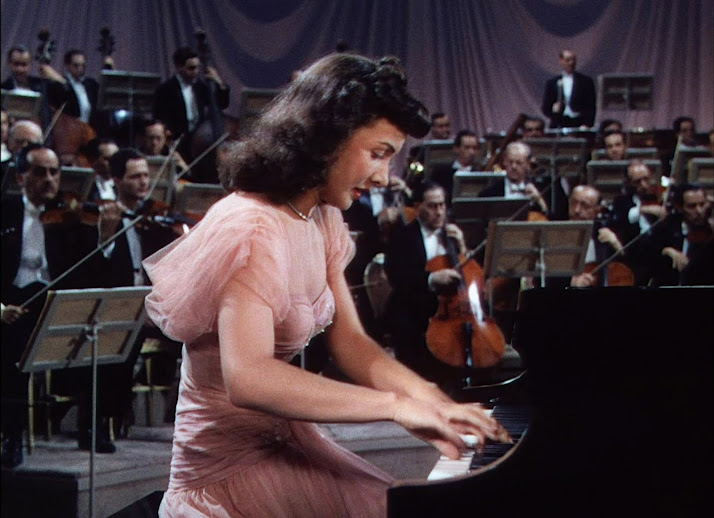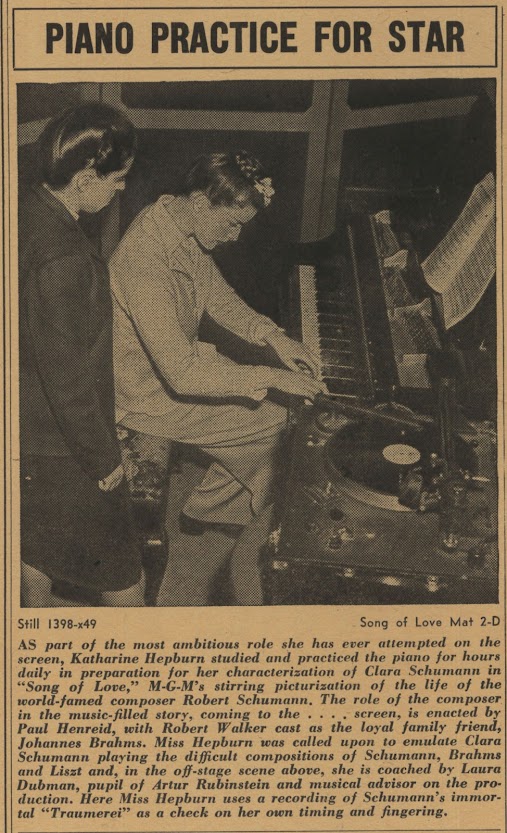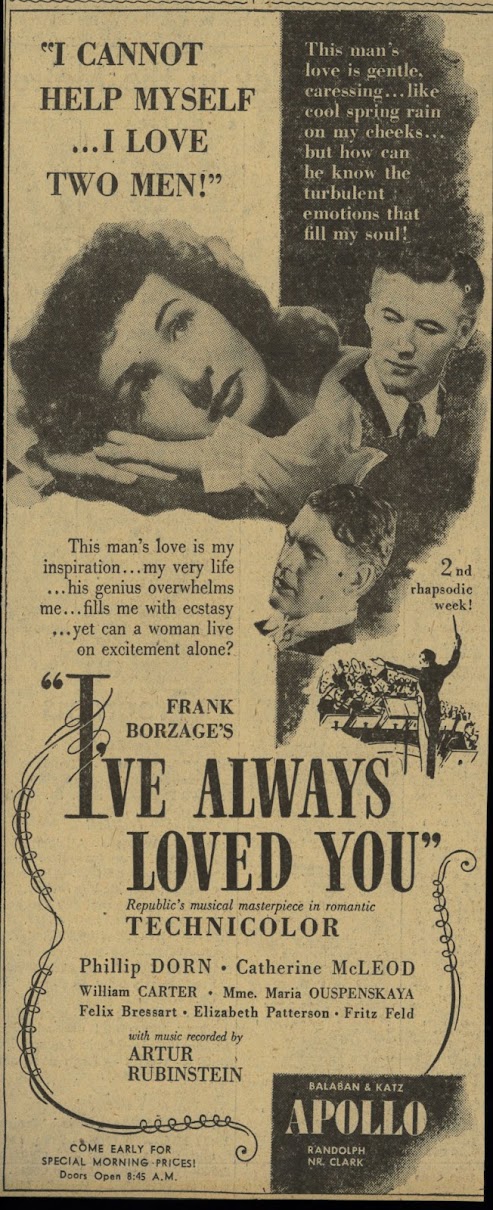Music for Hopefully Millions
 |
| She was Twitchy, Him Tormented, and Twirl Went Turnstiles for Columbia with A Song to Remember |
Could Classical Come Back?
To collect silent movies was to find music that would accompany them. This didn’t occur to most of us age ten and watching Castle reels of Dracula, or The Lost World, those but glimpse of something it seemed we’d never own complete. Same with Woodpecker cartoons or Pluto caught on flypaper. I knew graduation to two-reel and intact subjects carried with it duty to supply sound for twenty minutes a Chaplin or Laurel and Hardy would last. Would I have applied myself more to piano lessons for realizing how handy they’d be to furnish accompany? The connection didn’t occur to me, so past went opportunity to learn a skill at the least useful for anyone who'd supply live in addition to screen entertainment. A phonograph made do, selections not ideal to all action projected, just now-and-then harmony between picture and sound. For a first several years I’d choose Chopin ... piano, not his concertos. I became a fan and would listen to him even without the films. Among “electives” at college was an appreciation course I was predisposed to enroll in, “The Enjoyment of Music,” among few keeper textbooks. The instructor was a lady who grew up in the forties and took a dim view of how Hollywood treated classical composers, being derisive toward A Song to Remember, the Chopin story as told by Columbia Pictures in 1945 wherein the suffering genius “spat bright red blood all over the piano keys,” a scene she called laughable for showing how movies always got true-based stories wrong.
 |
| Hep Ahead of Her Time Merle Wears Man Suits and Writes With a Green Feather --- I'm in Love! |
Goal became to see A Song to Remember, more dreamt of than done when Columbia TV packages seemed limited to 50’s titles and lone earlier outliers like Sahara or Dead Reckoning. I contented myself with stills and a horse-blanket sized pressbook to confirm A Song to Remember as a dynamo of its day. There even was a soundtrack album when those were 78 RPM’s in a treasure box to keep till big broom 33 LP swept cruder formats away. A Song to Remember was an experience its initial audience would not forget, a lift to Columbia followed up to even greater success with The Jolson Story, a then-cousin to Chopin for making old new again. Popularizing a classical composer had barely been done, certainly not to extent of Chopin here, MGM’s The Great Waltz of years before a noble but less lucrative try, its Strauss story an alright earner but cost-heavy as to see ultimate red, happy coda come 1946 when Leo, fired by rival success with A Song to Remember, reissued The Great Waltz to more than make up shortfall of before, such being reach of hit parading Chopin. Something about him spoke loud to kids and romantics, for how else do we account for his melody informing sock hit theme of Till the End of Time, disc coverers to include Perry Como among numerous others. Chopin in short became hot again and helped by Cornel Wilde playing him, teamed with gender-bending Merle Oberon in tailored suits to become a mid-forties fashion influence.
 |
| Bob Ripley Might Say "Believe It of Not" to This Assemblage of Song Endorsers |
Technicolor brightened costume setting with style its own revolutionary, most noted a scene where Oberon enters a dark room with a candelabra to reveal Wilde as Chopin performing (salon-goers think it’s Franz Liszt), a moment to forecast what Stanley Kubrick would decades later do with color and candlelight in Barry Lyndon. Song’s entire score was based on Chopin, reminding us how fit a utility he’d been and would continue to be for movies. There was something fresh if not eternal about this composer’s work, not music you’d have to “adjust” the audience to. Just start it up and stand back. Billed first for Song was Paul Muni playing his eccentric teacher-mentor after Yiddish theatre example, Muni’s own training ground. Lots say, and said in 1945, that he chewed scenes to powder, left no room for colleagues, which they’d complain of later. Nina Foch recalled Muni as “old-fashioned,” while Cornel Wilde found him insufferable, the older man off in his own world with no seeming recognition of partners in his actor orbit. It was Muni and nobody else so far as he saw it. Knowing Foch since she was a kid, Muni was friends with her father, so on the first day asked her, Do you want to be an actress or a whore? WTF she undoubtedly thought, figuring the shoot for an ordeal to come. I’ll guess Muni merely inquired in his singular way whether she’d apply herself to the art/craft or merely pull an ingenue plow. Being with Columbia threatened her plenty with that, Song but her second job after Return of the Vampire, abashing to her at the time. Any of us could have assured Nina that effort alongside Bela Lugosi was in fact an early summit.
 |
| "Song-Drenched Kisses" and "Champagne Love" --- Were These What Put Over Great Waltz Reissues? |
 |
| Poor Schumann Was Sort of a Mad Genius, But Not Homicidally So |
Was Frederic Chopin a Polish freedom fighter? He seems so here, not with guns aimed at Russian oppressors, though he does attend a secret meeting of rebels before massacre of same obliges him to decamp to Paris where remainder of narrative more/less takes place. This seems contrived even though Chopin was a booster for Polish rights and did compose music to support the cause, but we’re for the piano bench here, not Chopin ducking czarists. Writers may not have recognized early on that Chopin’s music would be plenty enough to sell this show. Merle Oberon as George Sand speaks for us where telling Frederic that he’s wasting time and energy trying to liberate a homeland when talent lies so spectacularly elsewhere. Oberon is meant to be pushy and dominating but like with so many film devices that try to manipulate my sympathies, I in fact sit firm in her corner, especially for fiery D/C/S speech to Wilde/Chopin (D/C/S meaning Davis/Crawford/Stanwyck). Of what I’ve read about A Song to Remember, few address the concert and performance scenes, which of course is bulk of what we wanted then and now to see. Pianos Chopin plays are the best of the best on 1945 terms, which means as good if not better than what we have today, but A Song to Remember took place during the lifetime of Frederic Chopin, which was from 1810 to 1849. According to Deems Taylor in a very informed essay he wrote decades ago (included in a compilation volume, Of Men and Music), instruments were throughout most of the nineteenth century inadequate to convey intent of composers, so give up hope of satisfactory time travel to concerts when classical was new.
 |
| Catherine McLeod Puts Over, and How, Keyboard Work for I've Always Loved You |
Chopin at his piano, or piano forte as it was then known, saw sky-high talent brought cruelly to earth each time he sat to perform. What was put on paper was brilliant --- as translated by instruments then-available, it was something else. Taylor wrote: “The piano upon which we now play … is not the clavichord or so-called pianoforte for which … composers had to write. That was an evolutionary instrument, halfway between the harpsichord, with its jacks and quills, and the modern piano. It did possess a rudimentary dynamic range --- its very name, pianoforte, is the perpetuated boast of its inventor that it could play both soft and loud; but its tone was a pale, characterless tinkle, compared with the singing thunders of a modern grand piano.” Reality of recitals amount to cold splash for those who’d imagine Chopin or any of contemporaries mesmerizing listeners of their era, Taylor asserting that “up to the very third quarter of the nineteenth century, a composer not only had to struggle to get his ideas down on paper but then had to worry about getting a decent performance.” Chopin was gone a generation before his century’s final third. Same was case for his contemporaries Robert and Clara Schumann, memorialized by Metro in 1947’s Song of Love, a screen bio hoping to duplicate Columbia’s success with A Song to Remember. Toward this end they’d fail for $2.6 million spent on the negative with result a million lost. Romance Leo hoped to celebrate was essayed by Katharine Hepburn (Clara) and Paul Henreid (Robert), with Robert Walker as Johannes Brahms, who according to history did spend most of his life in hopeless love with Clara. This might have clinched receipts had casting been different … not that anyone was inadequate, just sparks lacking where Cornel Wilde and Merle Oberon had them on Chopin behalf. Speaking to authenticity, Song of Love and A Song to Remember saw mutual casts sat before keys and obliged to finger in close tandem with music played, each more-less doing the Larry Parks thing only with pianos rather than voice. I look at Wilde or Hepburn hands sailing keyboards and wonder how the stars would sound if left to own devices rather than being dubbed. History records that of Song of Love principals, each of three could play, Hepburn so accomplished that an idea was floated to let us hear her rather than a pro dubber, but studio feet got cold, and besides, they had already paid for the do-over.
 |
| Hail Hail, the Classical Gang's All Here for Carnegie Hall |
MGM doesn’t get enough credit for enriching 40’s patronage. Look, or better listen, to Music for Millions, Song of Russia, or any of Kathryn Grayson or Jane Powell vehicles. Even some of the Tom and Jerrys. Stay into fifties and witness Rhapsody, now obscure perhaps but noticed and appreciated then. Take a hundred youth into any of these and who knows but what five, ten, maybe more, will come out tilted toward great music. This was servicing a big tent, and not just Metro was masterful at it. Any classical banquet screen-served, in whatever its size and majesty, had first to serve a story, be but handmaiden to melodrama its true, this needed to engage an audience not content with mere recital of music, however distinguished. Classics could be and were route to prestige for even Republic Pictures, set upon doing what Columbia with A Song to Remember had profitably done. I’ve Always Loved You was their two million investment toward industry standing not so far achieved with westerns and serials, Technicolor from Republic also unaccustomed. Love and its frustration was necessary backdrop to recital of Rachmaninoff, Mozart, Wagner, and yes, Chopin, plus others of classic repertoire. I could talk of production and reception the day through and come nowhere near exhaustive coverage by Jack Mathis in Republic Confidential, his multi-volume history in which “The Studio” addressed I’ve Always Loved You in stunning detail. No way could Mathis’ effort be bettered by me or anybody. I’ve Always Loved You was released on Blu-Ray by Olive, theirs derived from the UCLA restoration of a feature more-less unseen for decades. It’s a stunner of a celebration of all things classical, as is …
 |
| Shot Right Where It Happened by Edgar Ulmer, Who Sure Knew from Classics (Remember The Black Cat?) |
… Carnegie Hall from 1947 and another difficult find for years prior to DVD and occasional runs on TCM. Here was closest we commercially got to a concert feature long before such things became norm, yet like others Carnegie Hall had to serve audience need for narrative, being a family saga set inside the legendary Hall where the film was in large part shot. Carnegie Hall enjoyed long urban runs, set a record for electric lights to herald initial play at the Winter Garden in New York. As expected there were purist complaints of soppy drama getting in way of all-star classical performing, but how could 144 minutes pass if not with help of romance and mother sacrifice for sake of a son who chooses swing rather than symphonic? Issue is resolved by letting him have it both ways, thus Vaughn Monroe and His Orchestra and later Harry James cutting rugs alongside expected longhair artists. Producing Carnegie Hall was Boris Morros and William LeBaron, both with seasoned sense of how to best put over porridge of old with new. Concert stars, plus those from opera and cultivated elsewhere, would be humanized by interacting with story enactors Marsha Hunt, William Prince, Frank McHugh, and Martha O’Driscoll, all this shrewdly managed by director Edgar Ulmer, whose only lavish film this was. For splendid work here, why wasn’t Ulmer finally promoted to A features upon artistic and commercial wings of Carnegie Hall? It would earn domestic rentals of $983K, with foreign an additional $607K for distributor United Artists. Known well was Ulmer being blacklisted for conduct unbecoming an employee at Universal during the thirties (him purloining a wife from a U executive). The Ulmer marriage sustained so maybe career spank, a harsh one, was worth it. As is, and thanks in large part to Ulmer, Carnegie Hall represents apotheosis of classical celebration in otherwise contemporary and commercial focused medium that was movies.
UPDATE --- 7/29/2025: As we know, one of the greats among writer-historians is William M. Drew. Recent e-mails from William address Greenbriar's 7/14/2025 column about "voiceless" stars I thought we'd never hear. Not so for all, says Mr. Drew, and he supplies links (inc. Mary Miles Minter!). So much detail here I had to break it down to three parts to fit Google limits. Need I add, terrific stuff.






































